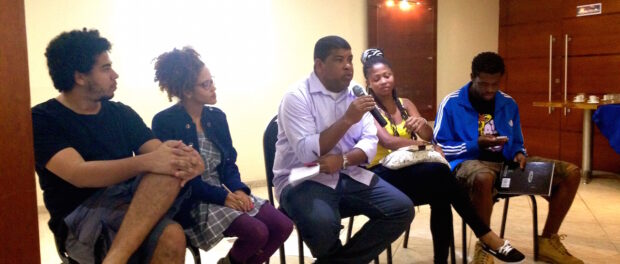
On Wednesday June 24, NGO Viva Rio hosted a public meeting in Gloria, in the South Zone of Rio to discuss the importance of collectives as a new form of community organization and their role inside and outside favelas. The debate was part of the organization’s digital inclusion project, Viva Favela.
The discussion was led by a panel of four leaders of communication collectives: Romário Regis of Agência PapaGoiaba in São Gonçalo (Greater Rio), Thamyra Thâmara of GatoMÍDIA in Complexo de Alemão (North Zone), William da Silva of Antiéticos in Vila Kennedy (West Zone), and Carla Siccos of CDD Acontece in City of God (West Zone), and was mediated by Francisco Marcelo, director of Caminho Melhor Jovem in Complexo da Maré (North Zone).
The panelists kicked off the debate by introducing themselves and their collectives, discussing the theme of collectives and their rising importance in favelas. Thamyra of GatoMÍDIA began the introductions, congratulating the initiative on such a “black and beautiful panel.”
Introducing the theme of collectives, Marcelo began the discussion by emphasizing the rising importance of social networks in creating media activism and “the possibility that favela residents have today of building their [own] channels and communication platforms.” With the rise of social media and social networks on the Internet, residents are able to self-organize in a decentralized manner that “brings an autonomy and legitimacy that is very cool.”
The panelists then described how their respective collectives developed, and what role they’ve played in the community. Thamyra said: “We speak for ourselves with our own language and I think that’s what really attracts those who don’t live in a favela.” GatoMÍDIA focuses on orienting community residents on social media so their content can be used as effective mechanisms of “communication, production, and resistance.”
She added: “There have always been tons of things happening in the favela. The Internet, with these social media platforms, empowers and provides visibility to attract others and create more empowerment.”
Carla Siccos said her collective, CDD Acontece, serves a similar function: to inform City of God residents about the positive services that are available in the favela. When discussing the origin of her organization, she said: “Everyone learns about the negative events in the community. No one is aware of the good things happening because there is a lack of communication.”
William of Antiéticos, a hip-hop group that acts as a platform for denouncing racism and promoting positive favela aspects, says his collective gives individuals a voice to express their wants and needs, and helps people develop their own projects.
Romario, of Agência PapaGoiaba, a digital communication collective that provides visibility to cultural productions in São Gonçalo, emphasized the importance of collectives in helping individuals find a trajectory in life.
When asked by an audience member what can be done to reduce youth involvement in drug trafficking, panelists agreed that collectives can play an important role in informing young residents of alternative job opportunities. However, Romario and Thamyra both emphasized that the majority of favela youth work at places like Bobs Burgers and McDonald’s and not in drug trafficking.
The panelists were also asked to discuss other topics, such as violence in the favelas, the Pacifying Police Units (UPPs) and the reduction of the age of criminal responsibility and how their communication collectives can have an impact in these realms.
Thamyra explained that communication collectives can help de-stigmatize favelas, not by avoiding the discussion of violence, but instead by presenting it from the point of view of the residents in the favela. She adds, “When collectives publish something, it’s not from those outside [the community] but from those inside.”
When discussing proposed legislation to lower the age of criminal responsibility in Brazil, all panelists expressed opposition. William da Silva cited education as the best means of hope and opportunity for young people, which he explained would be limited by reducing the age of criminal responsibility. He shared a compelling story of two minors who assaulted him with a gun on the bus. A few months later he saw one of the same boys on TV helping with a community project in Maré; the boy was on his way to university.
“I don’t know what their motivations were that day on the bus,” William said. “But they’re just kids, they’re still learning… I’ll never stop having hope for them.”
With regard to the UPP police presence, panelists such as Carla said police should interact more with favela residents to increase their knowledge of the community and reduce their stigmatized view, prejudice and, thus, tension.
Following the discussion, audience members praised the panel for their innovative community projects. The event ended with a mutual understanding that anyone can be a leader and have a voice by working collectively.

